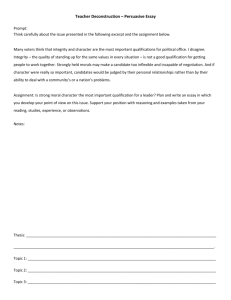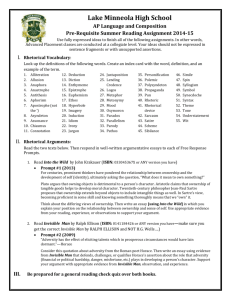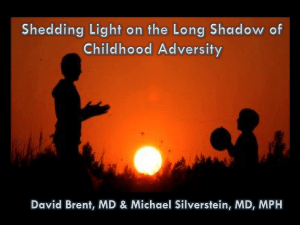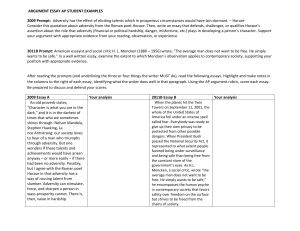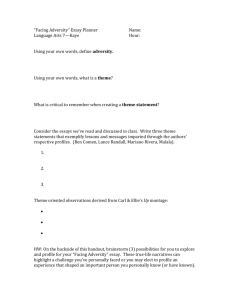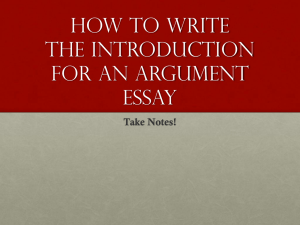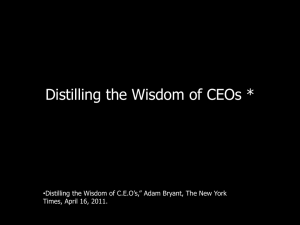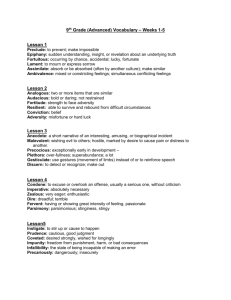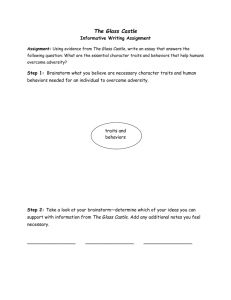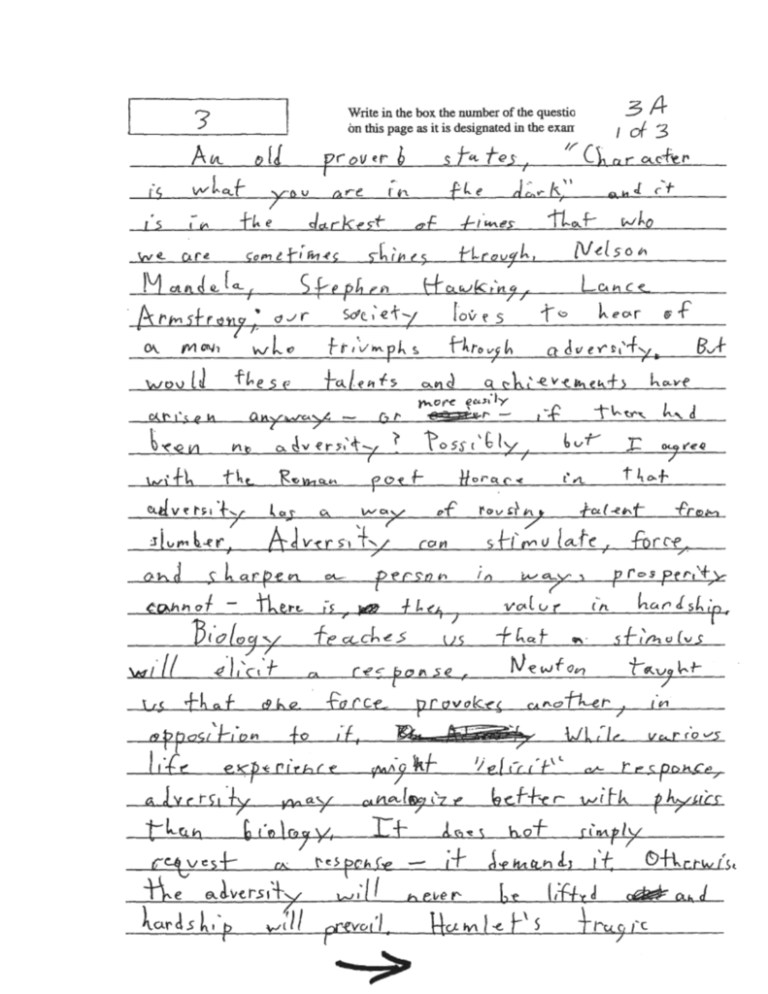
© 2009 The College Board. All rights reserved.
Visit the College Board on the Web:
www.collegeboard.com.
© 2009 The College Board. All rights reserved.
Visit the College Board on the Web:
www.collegeboard.com.
© 2009 The College Board. All rights reserved.
Visit the College Board on the Web:
www.collegeboard.com.
© 2009 The College Board. All rights reserved.
Visit the College Board on the Web:
www.collegeboard.com.
© 2009 The College Board. All rights reserved.
Visit the College Board on the Web:
www.collegeboard.com.
© 2009 The College Board. All rights reserved.
Visit the College Board on the Web:
www.collegeboard.com.
© 2009 The College Board. All rights reserved.
Visit the College Board on the Web:
www.collegeboard.com.
Overview
AP® ENGLISH LANGUAGE AND COMPOSITION
2009 SCORING COMMENTARY
Question 3
This question presented students with a quotation from Horace’s
Satires in which a dinner party guest, Balatro, observes, “Adversity has
the effect of eliciting talents which in prosperous circumstances would
have lain dormant.” Students were asked to consider the quotation and
write an essay in which they defended, challenged, or qualified that
assertion about the role of adversity in developing character. The
prompt suggested some possible types of adversity—financial or
political hardship, danger, misfortune. (This did not deter some
students from writing about advertising.) Students were encouraged to
provide support for their arguments with appropriate evidence from
their reading, observation, or experience.
This task hearkened back to the classical essay, presenting the very
type of theme that might have attracted Montaigne, Samuel Johnson,
Charles Lamb, or William Hazlitt. The question provided considerable
freedom, permitting students to use expository or narrative modes of
discourse in creating an original argument. The question encouraged
students to address how adversity affects the human condition, but
more sophisticated responses also looked at redefining adversity or
establishing the conditions under which adversity impacts humankind.
Fewer responses addressed the second half of Horace’s comment,
which implies that during times of prosperity, human beings may be
less likely to develop their latent talents or character strengths.
Sample: 3A Score: 8
This essay effectively crafts an argument in response to Horace’s
assertion about the role that adversity plays in developing character by
offering evidence and explanations that are both appropriate and
convincing. The argument builds steadily, anchored by a series of
logical deductions. The evidence is particularly full, as the student
draws upon an impressively broad body of knowledge—considering
famous figures, each of whom “triumphs” over adversity; offering
parallels to biology, physics, and engineering; and discussing an aptly
chosen novel (Brave New World, from which the student even quotes).
Such a breadth of examples provides a much richer source for
convincing argumentation than is found in lower- range essays, which
all too often limit themselves to singular and/or less significant
examples. The accompanying explanations in this essay demonstrate
insight and facility with critical thinking. First, the student qualifies
Horace's claim about adversity with a rhetorical question, recognizing
the possibility that Mandela, Hawking, and Armstrong might have
accomplished what they did even without the adversity each faced.
Later, the student lends qualified support to Horace’s claim regarding
prosperity (it “does not always engender growth”) and nicely concludes
the explanation of how Huxley’s novel validates Horace by mentioning
Shakespeare, whose character Hamlet serves as an example in the
student’s earlier discussion. The prose is not flawless: it slips into the
passive voice, offers prepositions without objects, and ends with an
awkward sentence. However, it does demonstrate a consistent and
sometimes impressive control of a wide range of the elements of
effective writing: the student has a rich vocabulary (“engender,”
“literary construct”); uses metaphor (“rousing talent from slumber”);
makes clear and clean transitions (“of course,” “on the other hand”);
understands parallel structure (“stimulate, force, and sharpen,” “It does
not simply request a response—it demands it,” and “are always fed . . .
are always happy”); and displays a facility in using dashes and
parenthetical phrases. This student converses comfortably with both
readers and the chosen sources by gently weaving qualifiers such as “or
more easily,” “[p]ossibly,” “say,” and “not merely” throughout the
essay while still managing to evince an authoritative voice.
© 2009 The College Board. All rights reserved.
Visit the College Board on the Web:
www.collegeboard.com.
Sample: 3B Score: 6
AP® ENGLISH LANGUAGE AND COMPOSITION
2009 SCORING COMMENTARY
Question 3 (continued)
This essay adequately defends Horace's assertion about the role
adversity plays in developing a person’s character with a pair of
appropriate examples, each accompanied by sufficient explanation. The
student opens with an unambiguous, albeit somewhat pedestrian, thesis
and defends it with two body paragraphs. The first starts with a defense
of Horace’s claim that prosperous circumstances do not elicit talent (“I
have a few friends that are extremely spoiled”) that is quick and
somewhat superficial but adequate. It then presents the example of
“[o]ne friend in particular” and illustrates how the student witnessed
adversity eliciting talent when a friend discovered she could cook only
after her mother became ill. The second body paragraph, in which the
student draws on reading and explains how adversity brings out talent
in The Grapes of Wrath, is happily more developed than the first. The
student works harder to tie the evidence to Horace, offering a
serviceable explanation that Rose of Sharon “was able to grow up and
mature much more quickly that [sic] she would have had it not been for
her miscarriage.” The prose contains lapses in syntax as well as diction,
but it remains generally clear, and it adequately expresses the student’s
ideas without confusion. In the final sentence of the Grapes of Wrath
paragraph (“She possessed an extreme nurturing nature that would
never have been discovered had it not been for adversity”) and the brief
conclusion, the student shows an adequate understanding of the role
adversity played in developing each girl’s character, which is what the
prompt asked students to do.
Sample: 3C Score: 2
Although Horace is never mentioned, this essay does attempt to
respond to the prompt. The student seems to have some understanding
of the relationship between adversity and character, noting that
adversity may actually make a person “better” because “[b]y
overcoming adversity, a feeling of confidence overwhelmes [sic] you
and makes you strive for excellnce [sic] in everything that you take
pride in.” However, the second and third paragraphs do little to advance
the argument. The evidence presented is very limited, consisting mainly
of generalities and assertions but no developed examples. The control
of language is weak, and the prose is immature. This response
demonstrates little success.

